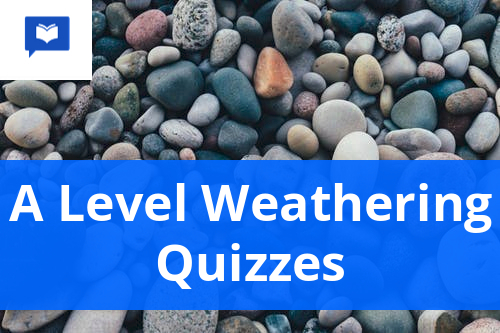A level Weathering Quizzes
Quiz Description
Revising Weathering with Quizzes
(Weathering quizzes for student doing the A Level GCE, GCSE and necta.)
Weathering is an aspect of Geography which describes the breaking down or dissolving of rocks and minerals on the surface of the Earth. Water, Ice, acids, salts, plants, creatures and changes in temperature are largely specialists of enduring
When a stone has been separated, a cycle called disintegration ships the pieces of rocks and minerals NO stone on earth is sufficiently hard to oppose the powers of enduring and disintegration. These two cycles, enduring and disintegration continually change the rough scene of the Earth. Shakes, for example, magmas which are immediately covered underneath different rocks are less helpless against enduring and disintegration than rocks that are presented to specialists, for example, wind. As it smoothens rough, sharp rock surfaces, weathering is often the first step in the production of soils
Weathering is often divided into the processes of mechanical weathering and chemical weathering. Natural enduring, in which living or once-living creatures add to enduring, can be a piece of the two cycles.
Mechanical Weathering: Mechanical enduring, likewise called physical enduring makes rocks disintegrate. Water, in one or the other fluid or strong structure, is regularly a vital specialist of mechanical enduring. For example, fluid water can saturate breaks and hole in stone. On the off chance that temperatures drop sufficiently low, the water will freeze. At the point when water freezes, it grows. The ice at that point fills in as a wedge. It gradually extends the breaks and parts the stone. At the point when ice liquefies, fluid water plays out the demonstration of disintegration via diverting the minuscule stone parts lost in the split. This particular cycle (the freeze-defrost cycle) is called ice enduring. Other animals dig and trample rock above the ground, causing rock to slowly crumble.
Chemical Weathering: Chemical weathering changes the molecular structure of rocks and soil. For example, carbon dioxide from the air or soil in some cases joins with water in a cycle called carbonation. This delivers a frail corrosive, called carbonic corrosive, that can disintegrate rock. Carbonic corrosive is particularly compelling at dissolving limestone. At the point when carbonic corrosive leaks through limestone underground, it can open up gigantic breaks or burrow out huge organizations of caverns. In some cases, compound enduring breaks down enormous bits of limestone or other stone on the outside of the Earth to shape a scene called karst. Another sort of synthetic enduring chips away at rocks that contain iron. These stones go to rust in a cycle called oxidation. Rust is a compound made by the cooperation of oxygen and iron within the sight of water. As rust extends, it debilitates rock and helps split it up.
Here, we're going to look at all the different types of weathering with so many quizzes for you to answer and improve on your knowledge in weathering for GCSE and GCE A levels and if you wish to answer quizzes on different topics, gcequiz has so many quizzes that tests your knowledge in all other aspects of Geography, click Here to select a different topic.
In this platform you'll find relative ease in practicing for your exams. For more info and quizzes in other subjects, visit gcequiz.com.



